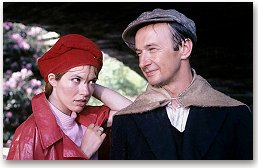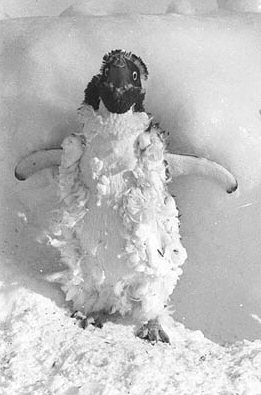Shortly after his stint on the Country Diary, and his abortive plans for a country dairy, Dobson conceived the idea of writing an Urban Diary. By keeping his observations to town and city, he reasoned, he would have no need to trespass in the countryside and thus run the risk of encountering peasants who, as he put it, “babble gibberish in the guise of rustic wisdom and so befuddle my brain”. Dobson hawked his idea around a few newspaper and periodical editors, but found no takers. Unwilling to abandon the idea, however, he issued what he intended would be the first in a lengthy series of pamphlets. This work, Trudges In Towns (out of print), has recently been hailed as a pioneering work of psychogeography, a judgement which may be based on a misreading of the critic Brent Crude, who suggested that “there is more psychosis than geography on display in this tatty pamphlet”.
The title, with its plural Towns, is somewhat misleading, as so far as we know Dobson never went further than a single town, Pointy Town, in search of material. In fact, unstinting research by hothead young Dobsonist Ted Cack suggests that the pamphleteer barely moved from one spot while working on the text.
This is by no means, writes Cack, the work of a flaneur, nor even of a pedestrian. What I have discovered in the course of my unstinting research is that Dobson barely moved from his escritoire while writing Trudges In Towns. He might have popped into the kitchen to boil some water in a kettle preparatory to pouring it into a teapot into which he had already spooned, from a caddy, a modicum of tea leaves, and he may have remained in the kitchen, staring vacantly out of the window, at crows or cows or trees or whatever it was that was visible outside his window at that time, while he waited for the tea leaves to infuse the hot water, and he would still have been in the kitchen, away from his escritoire when, eventually, he rested a tea-strainer over his cup and poured tea through it from the teapot, into the cup, before adding a dash of milk, poured delicately from a bottle taken from the refrigerator, also located in the kitchen, and, making use of a teaspoon from the cutlery drawer, stirred the decoction so that milk and tea-infused water were throroughly and inextricably intermingled, and he would only return to his escritoire and get some bloody scribbling done when, having placed the cup of tea atop a saucer, he carried it out of the kitchen, before which he would have ensured that the tea-strainer and the teaspoon had been rinsed under the tap and placed for the time being on the draining board anent the sink, there to dry in the warm fug of kitcheny air. But that was about as far away from his escritoire as he got. There is no evidence that he ever trudged the streets of Pointy Town, alert to the sights and sounds and smells of what Keith Pratt, husband of the toyshop assistant Candice-Marie Pratt, famously termed “the hurly burly of the urban conurbation”. I forgot to mention, by the way, that before rinsing the tea-strainer under the tap in the sink, Dobson would have deposited the tea leaves caught in the strainer into a waste bin in the kitchen, one with a flip top lid, a lid raised and lowered by depressing a pedal at the exterior base of the bin with the sole of his foot. Some might accuse me of wittering away with far too much detail about the inconsequentialities of Dobson’s doings, but in my view it is the duty of a biographer to act as a conjuror who makes his subjects “walk and appear that have layen in their graves many hundreds of years”, as John Aubrey put it. And, yes, I am well aware that Dobson has not been dead that long, but I am writing for posterity, even if I am writing a short article for a tatty magazine rather than a big fat biography.
Ted Cack need not justify his methods to me. I am always delighted to read even the most trivial prattle about the twentieth century’s titanic out of print pamphleteer. In fact, I would be spellbound by an account of his making of coffee, or cocoa, or his boiling of potatoes, or his chopping of carrots, or a myriad of other activities, those performed in the kitchen and elsewhere. Each fragmentary glimpse of Dobson contributes to our portrait of the man, in all his Dobsonosity. Quite frankly, I don’t care if all that stuff he wrote in his Urban Diary was mere figment, embroidered from the stuffing of his brain, rather than based on direct observation of whatever was going on in Pointy Town at the time.
But what, precisely, was that stuff? And why did not a single newspaper or periodical editor show the slightest interest in it? After the initial rejections, Dobson thought that by issuing the pamphlet as a kind of sampler, and sending copies to editors, he would have them fighting tooth and claw, bidding ever more ridiculous sums of money, to engage him as a regular urban diarist. In the event, the tatty pamphlets were chucked, unread, into bins, much like the tea leaves from Dobson’s tea strainer. Trudges In Towns was meant to be the first in a series, but no subsequent pamphlets were ever written, and it stands alone and isolated in the Dobson canon.
The problem, I think – and Ted Cack agrees with me – is that the day Dobson chose to write about for his first Urban Diary happened to be a day on which all the countryside persons for miles around descended upon Pointy Town en masse, with their carts and horses and hay and straw and turnips and potatoes and shapeless hats and smocks and muck and slurry and what have you. Even if the pamphleteer had roamed further than his kitchen, in the streets and alleys and mews of Pointy Town he would have met with nobody but peasants, wide-eyed and dribbling and, of course, babbling gibberish in the guise of rustic wisdom and so befuddling Dobson’s brain.
It is his very befuddlement that is expressed in the text, which makes no sense whatsoever, and is largely unreadable. Even young hothead Ted Cack doesn’t understand it, nor even claim to, and that is saying something.
A new edition of Trudges In Towns, in which all the original words are crossed out and replaced by others, from opposite ends of the dictionary, is currently in preparation. Ted Cack is writing an extremely lengthy foreword, in which he promises to examine in detail Dobson’s habitual method of tying his bootlaces in the first week of March 1954.



